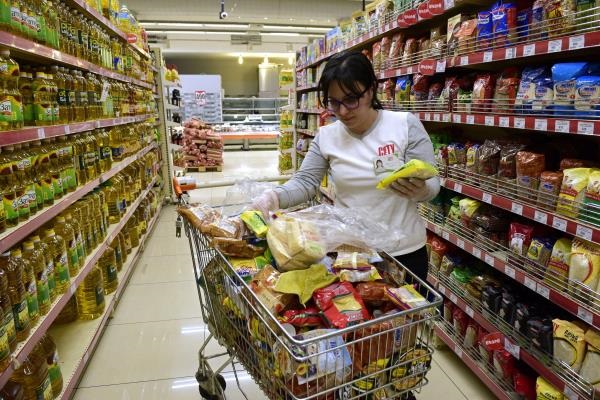
10 March 2021, Rome - Open and transparent food commodity markets and efficient supply chains are paramount to ensure that everyone has access to adequate, safe and nutritious food during the COVID-19 pandemic and beyond, FAO Director-General QU Dongyu said today at the opening of the 74th Session of the FAO's Committee on Commodity Problems (CCP).
"The pandemic has resulted in a dual shock to food and agricultural markets, hitting both: supply and demand," Qu said. He pointed out that the measures introduced to control the virus caused disruptions to agri-food supply chains affecting the global trading system and, in particular, the least developed countries that depend on trade for their food security.
To this end, the Director-General noted that FAO's work under the mandate of the Committee on Commodity Problems helped to calm markets and guide policy decisions, by providing up-to-date information on market conditions, monitoring policy developments, and proposing policy options to avoid the health crisis turning into a global food crisis.
Referring to the pandemic as "an astonishing wake-up call on the fragility of our agri-food systems and the vulnerabilities we face," the Director-General stressed that the current crisis also provided an opportunity to redouble and refocus global efforts to build back better.
"It made it clear that business-as-usual is no longer a viable option, and that we must change our food consumption and production patterns," the FAO chief said alluding to the challenge of transforming global agri-food systems towards safer and more nutritious food for everyone, while ensuring environmental sustainability.
Spike in global food prices
In his remarks, Qu also expressed concerns about the spiking food prices, registering their ninth consecutive monthly rise in February and reaching their highest level since July 2014. He said it would make it difficult for many countries to pay their food import bills, with potential implications for food security and nutrition, especially for the most vulnerable and poor.
To address this issue, he underlined the importance of increasing transparency for market conditions and policies to reduce uncertainty and ensure the proper functioning of commodity markets. Doing so requires investment and capacity development, he added, encouraging FAO Members to use such mechanisms as the Agricultural Market Information System (AMIS) and the Global Information and Early Warning System (GIEWS).
Despite a crucial role trade plays in providing the variety and availability of foods to consumers, the Director-General also warned about certain risks it poses. He highlighted that trade liberalization must be accompanied by measures to ensure that farmers and workers that are adversely affected by import competition are covered by adequate social protection programmes and have access to technical support to build capacity to improve their productivity.
Bridging the digital divide
The Director-General also welcomed the Committee's intention to focus on digital innovation among other issues this year.
"The future of agriculture is in digital technologies. They can produce significant gains in terms of efficiency, help markets to function better, and facilitate food trade", he noted, citing as an example e-commerce in food and agricultural products which helps to enhance farmers' access to markets.
However, to ensure that these gains are shared by all, it is crucial to reduce the current digital divide and address the specific needs of smallholder farmers, Qu added.
The Director-General reiterated FAO's support to all Members with innovative and transformative approaches, including FAO's evidence-based, country-led and country-owned Hand-in-Hand Initiative, the holistic COVID-19 Response and Recovery Programme, and the newly developed FAO Strategic Framework that focuses on the agri-food systems transformation to make them more efficient, inclusive, resilient, and sustainable.
COVID-19 impact on commodities
During the opening session, FAO Chief Economist Máximo Torero Cullen provided additional insights into the impacts of the COVID-19 pandemic on various agri-food commodity markets and trade. He said that monitoring of market and policy responses to COVID-19 has proved that agri-food systems are more resilient than other sectors of the economy. Global food markets remain well supplied and prospects are favourable, at least for basic foodstuffs.
However, he stressed that the problem was more about the access to food rather than its availability. Torero said that the global economic contraction triggered by the pandemic resulted in increasing unemployment rates and an overall reduction in incomes and purchasing power, forcing people to switch to cheaper, less nutritious diets.
While vegetable oils, sugar, meat, dairy and fisheries products have all been affected by the declining or stagnating demand, the meat and fisheries sectors have been more affected by disruptions in production processes and restrictions on the movement of workers and fishing vessel crews, Torero added.
About CCP74
CCP is the oldest FAO's Technical Committee established in 1949 that reviews global issues impacting the production, trade, distribution and consumption of food and agricultural products. It is made up of 113 FAO Members, plus observers.
The Committee's 74th Session, taking place virtually on 10-12 March, is reviewing the latest developments in food and agricultural markets and examines market outlook, including medium-term projections. The delegates will also discuss the findings of FAO's flagship publication The State of Agricultural Commodity Markets (SOCO) 2020 on the theme "Agricultural Markets and Sustainable Development: Global value chains, smallholder farmers and digital innovations". Furthermore, CCP74 will provide guidance on FAO's work programme in commodity markets and trade for the period 2022-25 and beyond.